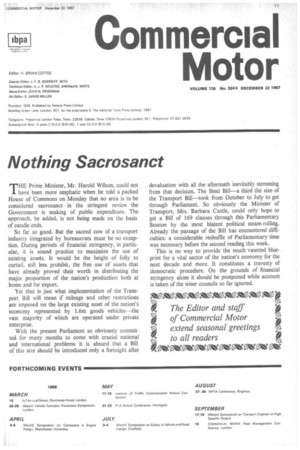Nothing Sacrosanct
Page 13

If you've noticed an error in this article please click here to report it so we can fix it.
THE Prime Minister, Mr. Harold Wilson, could not have been more emphatic when he told a packed House of Commons on Monday that no area is to be considered sacrosanct in the stringent review the Government is making of public expenditure. The approach, he added, is not being made on the basis of candle ends.
So far so good. But the sacred cow of a transport industry integrated by bureaucrats must be no exception. During periods of financial stringency, in particular, it is sound practice to maximize the use of existing assets. It would be the height of folly to curtail, still less prohibit, the free use of assets that have already proved their worth in distributing the major proportion of the nation's production both at home and for export.
Yet that is just what implementation of the Transport Bill will mean if mileage and other restrictions are imposed on the large existing asset of the nation's economy represented by 1.6m goods vehicles—the vast majority of which are operated under private enterprise.
With the present Parliament so obviously committed for many months to come with crucial national and international problems it is absurd that a Bill of this size should be introduced only a fortnight after devaluation with all the aftermath inevitably stemming from that decision. The Steel Bill—a third the size of the Transport Bill—took from October to July to get through Parliament. So obviously the Minister of Transport, Mrs. Barbara Castle, could only hope to get a Bill of 169 clauses through this Parliamentary Session by the most blatent political steam-rolling. Already the passage of the Bill has encountered difficulties: a considerable reshuffle of Parliamentary time was necessary before the second reading this week.
This is no way to provide the much vaunted blueprint for a vital sector of the nation's economy for the next decade and more. It constitutes a travesty of democratic procedure. On the grounds of financial stringency alone it should be postponed while account is taken of the wiser councils so far ignored.




















































































